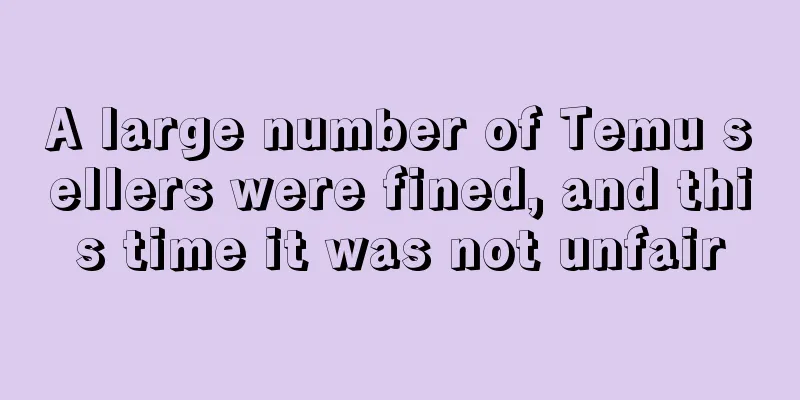A large number of Temu sellers were fined, and this time it was not unfair

|
Around November 12, 2024, a large number of Temu sellers suddenly received notifications of restricted funds due to falsified qualifications.
After the fine incident began to ferment, sellers quickly organized themselves into groups, and at one time many Temu sellers affected by the fine incident flocked in .
Are there sellers who have been restricted to more than 1 million?
At 10 a.m. on November 14, there were less than 50 people in a Temu sellers group. In less than half a day, the number of people in the group surged to about 150. This is just one of many groups. It is conceivable how wide the impact of this fine is.
After seeing the notice of restricted funds, most sellers’ first reaction was surprise and shock. Some sellers said that they did not get effective feedback after contacting buyers, so they joined the group hoping to find more people with similar experiences to “band together for warmth.”
According to statistics, the amount of fines ranged from a minimum of 10,000 yuan to a maximum of over 1 million yuan. According to the group owner, he had a balance of more than 1 million yuan in his store, but withdrawals have been restricted and it is possible that all of it will be lost. Another small seller said that he only sold 40 pairs of socks, but was restricted to 10,000 yuan and fined 3,000 yuan.
Some sellers speculated that the amount of the fine may be related to the seller's sales volume. The more they sell, the higher the fine. Some new sellers even said that they would be bankrupt this time.
"I haven't slept well for several days. When I close my eyes, all I can think about is fake qualifications and fines." "I've ended up with negative assets. I've worked for nothing this whole year." "I was fined 30,000 yuan on the 11th, and another 30,000 yuan at around 8 o'clock last night. It's already more than 60,000 yuan. I don't know how much more I will be fined."
Many sellers have raised questions about fines and restricted funds. Some sellers believe that fines and restricted funds may be two different things, and as long as the fines are paid, the restricted funds should be lifted. This statement was later confirmed by buyers.
Some sellers also said that they can appeal if the amount is restricted and submit the information within 7 days. If the appeal is successful, the restriction can be lifted. However, most sellers believe that the probability of a successful appeal is low.
In addition to fines and funding restrictions, many sellers’ links were also removed from the shelves. In response to this situation, the buyer sent a notice stating that new qualifications could be uploaded and the links could be put back on the shelves after passing the review.
Combined with the feedback from some sellers, it can be found that both fully-managed and semi-managed sellers were affected by this qualification fraud incident, which shows the platform's determination to crack down on qualification fraud this time.
However, compared with the previous fines, the sellers’ reactions this time seemed to be more rational. They did not impulsively want to defend their rights. Instead, they were relatively calm about the fines and just hoped that the fines would not be increased on the existing basis. What’s going on?
“It’s indeed fake.”
According to the feedback from sellers in the group, almost all of the fined sellers had falsified qualifications, which is why they did not choose to "protect their rights."
"I did fake it, admit it." "If you have confirmed that the fraud has occurred, you don't need to appeal. Just accept the punishment honestly." "As long as the fines are not increased, I can accept it. If the products are put back on the shelves and the fines are not increased, I won't be anxious about it."
Some sellers even said frankly that few people would spend a lot of money to get product qualifications when making new products. After all, there is no certainty whether the new product has the potential to continue in the long run.
In addition, there are many sellers who purchase goods from factories and thought that the products had formal qualifications. Later, they discovered that the factories could not provide relevant certificates. After being fined, they could only blame themselves for their bad luck.
A seller asked, is the only solution now to re-upload qualified qualifications? Not only is it expensive, but it also takes a long time. Many sellers already have the answer to this question. "If you upload fake ones again, you will be cleared out, so you'd better apply for qualifications honestly." A seller replied.
It is understood that many testing agencies have been overwhelmed with orders. One seller said that he has to beg agencies to do testing for him every day, which is really humble.
On the other hand, some agencies have told buyers that they need one certificate for each product, and if the seller has many products, it will cost a lot of money just to get the qualification. However, some sellers pointed out that buyers have not received any notification that they need one certificate for each product, and they believe that those agencies said so just to make more money.
In addition, many organizations will ask sellers to sign a disclaimer. Not only do they not help sellers file complaints with the platform, but they only want to shirk their own responsibilities. This is also a point that makes many sellers helpless.
Judging from the current feedback, those testing agencies that have settled in the Temu platform are undoubtedly the safest choice. So far, many sellers have re-applied for qualifications and are waiting to get their qualifications approved before re-applying to get their links back.
Strictly checking qualifications is a move Temu has to make
Some industry insiders speculated that the sudden and strict investigation into the issue of fake qualifications was triggered by the resistance Temu encountered in Europe.
According to foreign media reports, the European Commission announced that it has launched a formal investigation into Temu in accordance with the Digital Services Act . The focus of the investigation includes the compliance of some of the products sold by Temu, especially possible illegal products, such as toys and cosmetics that do not meet EU safety standards.
If the commission finds that Temu has violated the law, it could face a fine of up to 6% of its annual global turnover.
It is understood that the focus of this investigation will be on how Temu monitors and restricts the sale of products on its platform. Specifically, the European Commission wants to understand Temu’s process for product review, including how it handles products that may not meet safety standards.
In addition, the EU will also assess how Temu manages merchants on its platform, especially what measures Temu takes to prevent sellers who have been suspended for violations from re-entering the market.
In this light, there is a reasonable explanation for Temu's sudden strict inspection of qualifications. Although this fine does have a significant impact on sellers, it has also indeed promoted the process of product compliance on the Temu platform. Temu Seller fine |
<<: Breaking through the peak season! Sellers discover new secrets to boost traffic
Recommend
What is Xiamen Yanxun Network Technology? Xiamen Yanxun Network Technology Review, Features
Xiamen Yanxun Network Technology Co., Ltd. was est...
What is ThomasNet.com? ThomasNet.com Review, Features
ThomasNet.com, formerly known as "The Thomas ...
What is WebMoney? WebMoney Review, Features
<span data-docs-delta="[[20,{"gallery"...
What is MaiChain? MaiChain Review, Features
MaiChain is a one-stop cross-border e-commerce sup...
What is BeReal? BeReal Review, Features
Founded in 2020 by French entrepreneur Alexis Bar...
What is BQool
BQool is a one-stop Amazon e-commerce operation s...
Amazon Handmade UK marketplace grows in popularity
Recently, research commissioned by Amazon's h...
What is Guangdong Smart Logistics? Guangdong Smart Logistics Review, Features
Guangdong Smart Logistics (Guangdong Smart Intern...
The dressing up trend is back, and American clothing and beauty products are hot-selling!
As countries relax epidemic control measures, mor...
What is Add-on Item? Add-on Item Review, Features
Add-on Item is a shopping cart item logo launched...
Pre-sale does not need to stay up late Tmall Double 11 starts at 8 o'clock tonight
"A better life is what we all aspire to . &q...
Australia steps up epidemic control measures, eBay provides business support to sellers
Due to the impact of the epidemic, some parts of ...
Losses and running away! Is this the biggest "pitfall" of cross-border transactions?
The various pitfalls on the cross-border road ......
Reaching new heights! Buy iPhone 15 for 0 Yuan on Amazon
The internal competition among Amazon sellers has...
What is Sears & Sears Review
Sears , Roebuck and Company (commonly known as Se...









